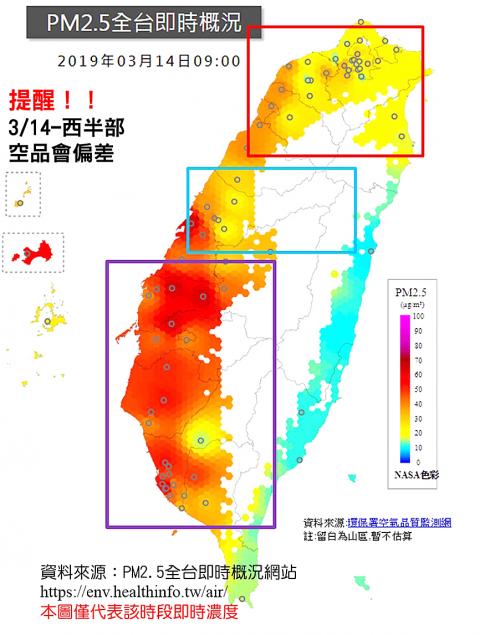Taichung residents in seven districts are being exposed to higher concentrations of eight first-level carcinogenic air pollutants, and the government should be treating the city’s pollution as a national security crisis, an academic told a public hearing on Saturday.
The hearing held by the Taichung Environmental Protection Bureau at Chung Shan Medical University focused on the bureau’s latest report on the city’s air pollution and its effect on health.
People living in districts near the state-run Taichung Power Plant, which has 10 coal-fired units and four oil-fired units, the Dragon Steel Corp plant and the Central Taiwan Science Park are exposed to eight first-level airborne carcinogenic pollutants, including arsenic, dioxin, cadmium and nickel, said Liaw Yung-po (廖勇柏), a professor at the university.

Photo: CNA
The concentrations of carcinogenic pollutants are higher in Longjing (龍井), Situn (西屯), Dadu (大肚), Daya (大雅), Cingshuei (清水), Houli (后里) and Wuci (梧棲) than the city’s other districts, Liaw said his research had found.
People who inhale such pollutants, regardless of the amount, face certain health risks, Liaw said.
The concentrations of the pollutants are related to the level of PM2.5 — fine particulate matter measuring 2.5 micrometers or less in diameter, he said.
The air pollutants interact with other environmental factors as well as viruses, and pose a greater danger to pregnant women, the elderly and children, he added.
The government must tackle the pollution problem by monitoring the first-level carcinogenic pollutants and work to curtail or eliminate their concentrations in the air, Liaw added.
The government should allocate more funding to research on diseases caused by air pollution, said Shang Chun-hsi (尚君璽), an assistant professor at Tunghai University.
Taichung-based physician Lai Yi-chun (賴怡均) called on environmental authorities not to “beautify” air pollution data, so that people can be aware of the dangers.
The bureau’s report proves that the city’s air pollution is related to the power station and the steel plant, and the government should force them to reduce their emissions, Homemakers United Foundation member Hsu Hsin-hsin (許心欣) said.
The bureau said it would take into account the opinions as it works to improve its pollution control efforts, adding that three other public hearings would be held later this month.

Taiwanese can file complaints with the Tourism Administration to report travel agencies if their activities caused termination of a person’s citizenship, Mainland Affairs Council Minister Chiu Chui-cheng (邱垂正) said yesterday, after a podcaster highlighted a case in which a person’s citizenship was canceled for receiving a single-use Chinese passport to enter Russia. The council is aware of incidents in which people who signed up through Chinese travel agencies for tours of Russia were told they could obtain Russian visas and fast-track border clearance, Chiu told reporters on the sidelines of an event in Taipei. However, the travel agencies actually applied

Japanese footwear brand Onitsuka Tiger today issued a public apology and said it has suspended an employee amid allegations that the staff member discriminated against a Vietnamese customer at its Taipei 101 store. Posting on the social media platform Threads yesterday, a user said that an employee at the store said that “those shoes are very expensive” when her friend, who is a migrant worker from Vietnam, asked for assistance. The employee then ignored her until she asked again, to which she replied: "We don't have a size 37." The post had amassed nearly 26,000 likes and 916 comments as of this

New measures aimed at making Taiwan more attractive to foreign professionals came into effect this month, the National Development Council said yesterday. Among the changes, international students at Taiwanese universities would be able to work in Taiwan without a work permit in the two years after they graduate, explainer materials provided by the council said. In addition, foreign nationals who graduated from one of the world’s top 200 universities within the past five years can also apply for a two-year open work permit. Previously, those graduates would have needed to apply for a work permit using point-based criteria or have a Taiwanese company

The Shilin District Prosecutors’ Office yesterday indicted two Taiwanese and issued a wanted notice for Pete Liu (劉作虎), founder of Shenzhen-based smartphone manufacturer OnePlus Technology Co (萬普拉斯科技), for allegedly contravening the Act Governing Relations Between the People of the Taiwan Area and the Mainland Area (臺灣地區與大陸地區人民關係條例) by poaching 70 engineers in Taiwan. Liu allegedly traveled to Taiwan at the end of 2014 and met with a Taiwanese man surnamed Lin (林) to discuss establishing a mobile software research and development (R&D) team in Taiwan, prosecutors said. Without approval from the government, Lin, following Liu’s instructions, recruited more than 70 software